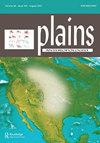Obituary, George Carr Frison (1924–2020)
Q2 Social Sciences
引用次数: 0
Abstract
The entire Plains anthropological community lost a giant with the passing of George C. Frison on September 7, 2020. His life story and professional accomplishments are near legendary, especially among his students. Doc, as he was fondly called, was born on November 11, 1924, and raised by his grandparents on the family ranch near Tensleep, Wyoming. His Depression-era childhood, spent pushing cows, riding the range, and finding artifacts along the way, exerted profound influence on his life and professional career. It was through this experience that Doc gained a deep understanding of landscape, learned to hunt to feed his family, and developed what would prove to be an insatiable curiosity about the ancient inhabitants and cultures of the region. Doc was a 17-year-old high school senior when the Japanese bombed Pearl Harbor on December 7, 1941. He wanted to enlist, but his grandmother would not sign the permission papers. After high school graduation in 1942, he enrolled at the University of Wyoming (UW) until he turned 18 and then enlisted in the U.S. Navy. After training in gunnery control systems, George spent the remainder of World War II in the South Pacific. I never heard Doc talk much about the war, but he was intensely proud of his service. His birthday, which coincided with Veteran’s Day, was the one day of the year that he did not come into his lab at UW. In October 2011, George traveled to Washington, DC, on the Honor Flight with otherWorldWar II veterans. Though he did not say much (typically), it was clearly an important and a moving experience for him. George returned toWyoming in 1946, happy to leave the Navy and bouts of seasickness. He soon became reacquainted with June Glanville, who proved to be the love of his life. They married that same year and moved back to the ranch. In 1956, they adopted their daughter Carol. George and June were married just shy of 65 years; she passed shortly before their anniversary in 2011. Ranching in the postwar years was difficult, despite improvements such as electricity, mechanized equipment and insulated boots, and the family ran an outfitting business for additional income. Doc’s interest in archaeology also grew. He visited the Horner site excavations and did some of his own work at several rockshelters near the ranch. He began communicating with Marie Wormington at the Denver Museum of Natural History, doing occasional fieldwork with Bill Mulloy at UW, joined the Society for American Archaeology and the Wyoming Archaeological Society, and took artifacts to the 1958 Plains Conference. Doc was badgered by Preston Holder and Don Lehmer at that Plains Conference to go to university. After considerable introspection, George and June gradually reached the decision to sell the ranch and move to Laramie, where George would reenroll at the University of Wyoming and start the journey of becoming a professional archaeologist.讣告,乔治·卡尔·弗里森(1924–2020)
2020年9月7日,乔治·C·弗里森去世,整个平原人类学界失去了一位巨人。他的人生故事和职业成就近乎传奇,尤其是在他的学生中。人们亲切地称他为Doc,他出生于1924年11月11日,由祖父母在怀俄明州Tensleep附近的家庭牧场抚养长大。他在大萧条时期的童年,推着奶牛,骑着牧场,一路上寻找文物,对他的生活和职业生涯产生了深远的影响。正是通过这段经历,Doc对景观有了深刻的理解,学会了狩猎来养活家人,并对该地区的古代居民和文化产生了永不满足的好奇心。1941年12月7日,日本轰炸珍珠港时,Doc还是一名17岁的高中生。他想应征入伍,但他的祖母不愿在许可证上签字。1942年高中毕业后,他进入怀俄明州大学(UW)学习,直到18岁,然后加入美国海军。在接受了射击控制系统的训练后,乔治在南太平洋度过了第二次世界大战的剩余时间。我从来没有听医生谈论过战争,但他为自己的服务感到无比自豪。他的生日恰逢退伍军人节,是一年中他没有来华盛顿大学实验室的一天。2011年10月,乔治与其他二战老兵一起乘坐荣誉航班前往华盛顿特区。尽管他(通常)没有说太多,但这对他来说显然是一次重要而感人的经历。1946年,乔治回到怀俄明州,很高兴离开海军,并多次晕船。他很快就重新认识了琼·格兰维尔,事实证明她是他一生的挚爱。他们同年结婚,搬回牧场。1956年,他们收养了女儿卡罗尔。乔治和琼结婚还不到65岁;2011年,她在结婚周年纪念日前不久去世。尽管电力、机械化设备和绝缘靴等方面有所改善,但战后几年的牧场经营很困难,这家人经营着一家服装公司以获得额外收入。Doc对考古学的兴趣也与日俱增。他参观了霍纳遗址的发掘,并在牧场附近的几个岩石避难所做了一些自己的工作。他开始在丹佛自然历史博物馆与玛丽·沃明顿交流,在华盛顿大学与比尔·穆洛伊偶尔进行实地调查,加入美国考古学会和怀俄明州考古学会,并带着文物参加1958年平原会议。Doc在平原会议上被Preston Holder和Don Lehmer纠缠着要上大学。经过深思熟虑,乔治和琼逐渐决定卖掉牧场,搬到拉勒米,在那里乔治将重新进入怀俄明州大学,开始成为一名专业考古学家的旅程。
本文章由计算机程序翻译,如有差异,请以英文原文为准。
求助全文
约1分钟内获得全文
求助全文

 求助内容:
求助内容: 应助结果提醒方式:
应助结果提醒方式:


